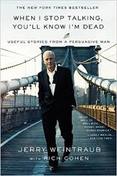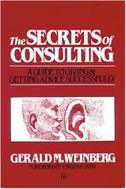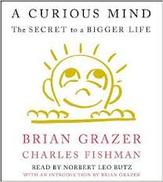 I just finished the heartwarming and inspiring book When I Stop Talking, You'll Know I'm Dead: Useful Stories from a Persuasive Man by Jerry Weintraub and Rich Cohen. I heard about it from Ryan Holiday's reading newsletter. This was almost my second book in a row about the entertainment business and true hustlers in that realm (the one I finished earlier this month was A Curious Mind by Brian Glazer). And both harken back in my mind to The Kid Stays in the Picture by Robert Evans, which I read in 2013. And just last week I watched Supermensch, about Shep Gordon, which my friend recommended to me and which I loved. So much can be learned about life from the crazy lives all these guys have lived! I really, really liked this book by Weintraub. It was co-written with Rich Cohen, who wrote The Fish That Ate the Whale, which I really enjoyed reading last year. It was a combination of street-smart lessons, advice for business and personal life, and lots of hilarious anecdotes about crazy times with some of the most famous people ever (Elvis, Sinatra, etc.). I was very sad to hear that only a couple months ago Jerry passed away. This book is truly a gift that he has left us. Below are some of my biggest takeaways from its many wonderful stories.
0 Comments
 Our office engineering reading group just finished going through The Secrets of Consulting: A Guide to Giving and Getting Advice Successfully by Gerald M. Weinberg. I really liked the book and got a lot out of it. It's not really about consulting; it's about dealing with other people in general and being street smart. The book's tone was very similar to Taleb's, Buffett's, and Munger's: brutally honest, realistic, and folksy. Every chapter was filled with amusing stories and anecdotes, illustrating his dirt simple ideas and why people often forget them. Below are my notes and biggest takeaways. As I read through the book, I saw so many examples of mistakes I had made or traps I had fallen into (like "Nothing new ever works" and the Law of Raspberry Jam), so reading this book was particularly meaningful for me. 1: why consulting is tough Sherby's laws 1: in spite of what client may tell u, there's always a problem 2: no matter how it looks at first, it's always a people problem 3: never forget they're paying you by the hour not by the solution 4: if they didn't hire u, don't solve their problem 10% promise: never promise more than 10% improvement. If u happen to achieve more, make sure it isn't noticed. Marvin's law: whatever the client is doing, advise something else Credit rule: you'll never accomplish anything if u care who gets the credit Lone Ranger fantasy: when clients don't show appreciation, pretend they're stunned by your performance, but never forget it's your fantasy not theirs Law of raspberry jam: wider you spread it, thinner it gets. Influence or affluence: take your choice. Weinbergs' law of twins: most of the time, for most of the world, no matter how hard people work at it, nothing of any significance happens. For most systems, prediction of tomorrow is same as today. Rudy's rutabaga rule: once you eliminate your number one problem, number two gets a promotion Hard laws of consulting Hard law: if u can't accept failure, you'll never succeed as a consultant Harder law: once u eliminate ur number one problem, YOU promote number two. Give up illusion that will ever finish solving problems. Learn to ignore problems. Hardest law: helping myself is even harder than helping others 2: cultivating a paradoxical frame of mind Consultants needed when logic not working Don't be rational; be reasonable People who think they know everything are easiest to fool The business of life is too important to be taken seriously Optimitis and tradeoff treatment Inability to resist solving problems Correct answer: what are you willing to sacrifice Tradeoff charts One performance measure vs another You don't get nothin for nothin Treatment: let me check my tradeoff chart Moving in one direction incurs a cost in the other Time trade offs Now vs later: balancing certainty with uncertainty Fisher's fundamental theorem: the better adapted u r, the less adaptable u tend to be Risk vs certainty: different risk appetites Third time charm: consultants tend to be most effective on the third problem u give them Orange juice test: We can do it--and this is how much it will cost 3 being effective when u don't know what ur doing Bolden rule: if you can't fix it, feature it Marvins medical secrets 90% of all illness cures itself with no intervention. Deal gently with systems that should be able to cure themselves. If it ain't broke don't fix it. Repeatedly curing a system that can cure itself will eventually create a system that can't. Every prescription has 2 parts: the medicine and the method of ensuring correct use If what they've been doing hasn't solved the problem, tell them to do something else Make sure they pay you enough so they'll do what u say. The most important act in consulting is setting the fee. Don't give up the treatment too soon. Don't stick with the treatment too long. Know how pays much less than know when. Featuring failure Bolden rule Faking success Gilded rule: if u can't feature it, fake it Inverse gilded rule: if something is faked, it must need fixing 4 seeing what's there Law of the hammer: The child who receives a hammer for Christmas will discover that everything needs pounding The study of history White bread warning: if u use the same recipe, you get the same bread Study other people or group's evolution before suggesting how u can do it better Don't ask others how to do something; ask them how they did it History teaches history teaches If you don't study history of org then will repeat mistakes Boulding's backward basis: things are the way they are because they got that way Sparks law of problem solution Chances of solving a problem decline the closer u get to finding out who was the cause of the problem Keep it simple and not too detailed; you're a consultant not a district attorney Study for understanding not criticism Look for what u like in the present situation and comment on it Why whammy We may run out of energy or air but not reasons Seeing beyond the conspicuous The bigness is not the horse Most of us buy the label not the merchandise The name of the thing is not the thing Label is not full description for understanding Maintenance vs design Create more specific labels and break things up misdirection method: using emotionally charged label 3 finger rule: when you point finger at someone, notice where other three fingers pointed 5 minute rule Clients always know how to solve their problems and always tell the solution in the first five minutes 5 seeing what's not there Browns brilliant bequest Words useful but always listen to the music (especially your own internal) Missing tools Absence of a tool is evidence of quality problem Look at non-problems to see what's working Reasoning from what isn't there Level law: effective problem-solvers may have many problems but rarely have a single dominant problem Look for missing histories and missing requests for help How to see what isn't there Find out what u usually miss in design a tool to ensure that you don't miss it again Use other people like janitors Investigate other cultures Use laundry lists Ridiculous Weinberg law of fetch: sometimes far fetched is only shortsighted Rule of three: if you can think of three things that might go wrong with your plans then there's something wrong with your thinking Loosening up your thinking Look for analogies Move to extremes look outside the boundary Look for alibis versus explanations The emotional component Incongruence insight: When words and music don't go together the point to a missing element 6 avoiding traps Titanic effect: thought that disaster is impossible often leads to an unthinkable disaster Staying out of trouble Laws rules and edicts Triggers Main Maxim: what you don't know may not hurt you but what you but you don't remember always does The potato chip principle: if you know your audience it's easy to set triggers Building your own system of bills that you can't ignore attach notes to remind u Tally cards: Record times of doing something you don't like Use physical devices use hand signals Mutual trigger pacts Using your unconscious mind Listen to the songs in your head Catchy commercials 7 amplifying your impact Teaching the blind: everyone sees a part of the whole and identifies the whole with that part Getting stuck Organizational jigglers to unstick systems Giving speeches Asking questions Less is more Teaching others to accept that other views are possible Ppl need shared experiences to be on same communication page 8 gaining control of change Romer's rule: best way to Lose something is to struggle to keep it Prescott's pickle principle: cucumbers get more pickled than brine gets cucumbered The system usually wins out against lone battler A small system that tries to change a big system through long and continued contact is more likely to be changed itself Roamer's rule: struggling to stay at home can make you a wanderer Homer's rule: struggling to travel can make you stay at home Fast food fallacy: no difference plus no difference repeated eventually equals a clear difference Ford's fundamental feedback formula: people can do anything they want as long as they personally have to live with the consequences Weinberg test: would you place your own life in the hands of this system? 9: how to make changes safely Rhonda's first revelation: it may look like a crisis, but it's only the end of an illusion Nothing new ever works Yet people always want something new Pandora's Pox: Nothing new ever works but there's always hope that this time will be different Living with failure Hope caused by marketers Dealer's choice: Trust everyone but cut the cards Let them try whatever they like, but teach them how to protect themselves Accept failure New system won't stop failures Failure is inevitable Trade improvement for perfection Apply rule of 3 to consider how new system can fail Invent a backup Preventive medicine Edsel edict: if u must have something new, take one, not two Choosing your time and place to put change into effect Volkswagen verity: if u can't refuse it (newness), defuse it Make practice runs in similar situation Break newness into parts to be adopted singly Let others share in the breaking in Rent before buy Buy new models near end of model year Add in one at a time, allow a generous breaking in period of lower productivity, give meaningful but not critical work, provide backups for inevitable failures Time bomb: response to these ideas as wasting time: time wounds all heels Surest way to waste time is to throw caution to the winds Rhonda's revelations It may look like a crisis but it's only the end of an illusion When change is inevitable we struggle most to keep what we value most Use others' struggle to understand what they value most When u create an illusion to prevent or soften change, the change becomes more likely and harder to take Never protect PPl from the truth 10: what to do when they resist U can make buffalo go anywhere as long as they want to go there Naming the resistance in a neutral way Keep mouth shut. Limit statement to 1-2 short sentences then stop talking. You can keep Buffalo out of anywhere just so long as they don't want to go there U can make someone move when u hit on something they want Introduce element of fantasy in asking what someone would change Find ways to relieve client fears and uncertainty Insurance Options 11 marketing ur services 9th law of marketing: spend at least 1/4 of ur time doing nothing I need more business vs I need more time Best way to get clients is to have clients Spend at least one day a week getting exposure Clients are more important to you than you can ever be to them Never let a single client have more than one fourth of your business Lynne's law of life: to be able to say yes to yourself be able to say no to any of your clients The best marketing tools is a satisfied client Give away your best ideas It tastes better when u add your own egg Involve the client in the solution Keep slack in schedule 12 putting a price on your head If they don't like your work, don't take their money Pricing has many functions only one of which is the exchange of money The more they pay you the more they love you The less they pay you the less they respect you The money is usually the smallest part of the price Pricing is not a zero sum game If u need the money, don't take the job Money is more than price Price is not a thing; it's a negotiated relationship Principle of least regret: set the price so u won't regret it either way All prices are ultimately based on feelings, both yours and theirs 13 how to be trusted Nobody but u cares about the reason u let another person down Trust takes years to win, moments to lose People don't tell u when they stop trusting u The trick of earning trust is to avoid all tricks People are never liars in their own eyes Always trust your client and cut the cards Never be dishonest even if the client request never be dishonest even if the client requests it Never promise anything Always keep your promise Get it in writing but depend on trust 14 getting people to follow your advice In spite of your best efforts some plants will die Never use cheap seeds or ideas A prepared soil is the secret about gardening Timing is critical The plants that hold firmest are the ones that develop their own roots Excessive watering produces weakness not strength  A close friend recently told me to read A Curious Mind: The Secret to a Bigger Life by Hollywood producer Brian Glazer. It was a quick, light read, and I enjoyed its collection of stories and observations about curiosity. Brian is right that little is taught or researched about this important power we all have. It was neat to see how one person's life was pretty much defined by this behavior and how he used "curiosity conversations" throughout his life to learn about others and seek inspiration from outside his field. It reminded me a lot of Tim Ferriss's podcast interviews and the Half Half Man Book Club. Below were some of my notes on the book and biggest takeaways. I liked how honest and straightforward the writing was, and it was neat to take a deep dive into the mind behind movies like Apollo 13 and A Beautiful Mind. Intro Curiosity helped him become movie producer and tell stories Sit down and have curiosity conversations with people in different fields 1 no cure for curiosity Not embarrassed to ask questions People like to talk, especially about themselves, and all you need is a simple pretext to talk to them Curiosity as way of uncovering ideas Did cold calls asking for 5 minutes with high level people; wrote intro, not looking for job, have specific question Had to meet new person daily Curiosity conversations At least one every 2 weeks Spend time with people outside your industry Ask questions to find stories 2: thinking like other people Ideas as currency Respect questions 3: curiosity insight 4: curiosity as superpower Make the hardest call of the day first 5: every conversation is a curiosity conversation Ask questions instead of giving instructions 6: good taste and anticuriosity When settled mind on project u want, stop getting more criticism and feedback when someone says no Need to develop some invulnerability 7 golden age of curiosity |
Archives
June 2024
Categories
All
Subscribe |
 RSS Feed
RSS Feed
